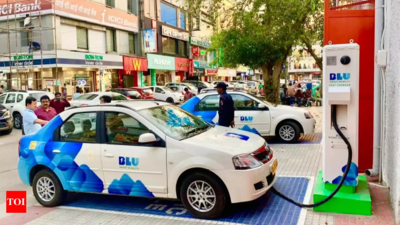- News
- City News
- delhi News
- 8,500 e-vehicles, 5,800 charging stations and 10,000+ active drivers: How BluSmart affects daily commuting in Delhi-NCR, Mumbai and Bengaluru
Trending
8,500 e-vehicles, 5,800 charging stations and 10,000+ active drivers: How BluSmart affects daily commuting in Delhi-NCR, Mumbai and Bengaluru
BluSmart, the EV ride-hailing service, abruptly suspended operations in Delhi-NCR, Mumbai, and Bengaluru, leaving commuters stranded and drivers in limbo. This disruption follows regulatory action by SEBI against BluSmart's promoter company, Gensol Engineering, due to alleged fund diversions and governance lapses.
NEW DELHI: With over 8,500 electric vehicles, more than 5,800 charging stations and a network of 10,000 active drivers, BluSmart carved out a niche in the urban commute landscape across Delhi-NCR, Mumbai and Bengaluru. But on Wednesday, the EV ride-hailing platform appeared to have gone dark leaving thousands of regular users stranded and its fleet largely off the roads.
BluSmart’s rise had been swift and steady. Launched in 2019, the platform carved out a niche in a market long dominated by Ola and Uber, offering an eco-friendly alternative with fixed fares, reliable rides, and clean vehicles.
Read related story: Commuters in Bengaluru, NCR get the blues as e-cab firm BluSmart pulls plug
For many passengers, it became a daily commuting mainstay. But its sudden suspension came after markets regulator Sebi barred the promoters of Gensol Engineering, BluSmart’s promoter company, from participating in the securities market over allegations of fund diversion and governance lapses.
Poll
How important is eco-friendly transport for you when choosing ride-hailing services?
App unresponsive, bookings halted, no official word
On Wednesday, several users across Delhi, Gurugram, Noida, Bengaluru and Mumbai reported being unable to make bookings on the BluSmart app.
In most cases, the date and time slots failed to load, and bookings wouldn’t go through.

Some drivers told TOI they were able to complete only pre-scheduled rides during the day, while others said they received messages from the company asking them not to report to work on Thursday.
The company did not issue any statement till late evening. When contacted, a BluSmart spokesperson declined to comment.
‘Where’s my ride, and my wallet money?’ ask worried users
For thousands of commuters, the sudden unavailability of BluSmart threw daily travel plans into disarray. “I couldn’t book a ride at 9 am. The app wouldn’t load slots. I later learnt my colleagues were facing the same issue,” said Priyanshi Saha, a Cyber Hub professional who lives in Sector 56, Gurugram. “This was the only service that had standard fares and was eco-friendly.”

Jagriti Kumar, an IT professional living near Dwarka Expressway, said BluSmart was her only reliable option to reach her office in Udyog Vihar. “It was consistent, never cancelled last minute, and charged Rs 400-450 every time. I’ll now be at the mercy of surge pricing and erratic drivers on other platforms.”
Several long-time users said they were also worried about the money stuck in their BluSmart app wallets. “I have Rs 1,700 in the wallet. There has been no communication about refunds,” said Abhijeet Ghosh, a central Delhi resident. Others like Kanika Tomar (Rs 2,500) and Ashish Malik (Rs 760) echoed similar concerns. “The silence from the company is unsettling,” said Kanika.
‘Clean cars, courteous drivers’: A model that worked, until it didn’t
Launched in 2019, BluSmart pitched itself as a zero-emission ride service built on a fleet-ownership model. Unlike Ola and Uber, where drivers owned or leased vehicles, BluSmart owned its EVs and employed drivers on fixed pay with incentives. Riders were offered clean, noiseless cars, punctual pick-ups and fixed fares—factors that helped it earn a loyal following.
Read related story: SEBI crackdown: BluSmart cab users left stranded in Delhi-NCR, Bangalore and Mumbai
“The drivers were always polite. There was no noise, no haggling, and no last-minute cancellations. I often chatted with the drivers—most were satisfied with their work,” said Ghosh, who used BluSmart for nearly two years.

Rachit Gupta, who commuted daily between Delhi and Gurugram, said the well-maintained fleet and punctual service had kept him hooked. “It was the best alternative to the chaos of Ola-Uber,” he said.
Drivers in limbo: ‘We don’t own the cars. What now?’
For drivers, the disruption could prove even more damaging. Since BluSmart owns the fleet, many drivers say they have little clarity about what lies ahead. “We were told a vendor would check our cars tomorrow and that we shouldn’t report to work,” said Dileep, a driver waiting at IGI’s T3 terminal. “If the company shuts down, we can’t switch to other platforms. We don’t own the cars.”
Arun, another driver from Faridabad, said he was paid Rs 3,200-4,300 for 10–12 hour shifts, with daily bonuses. “It was a good system. I didn’t get any bookings today. I don’t know what happens next,” he said.
Sebi crackdown
The disruption in services followed Sebi’s interim order on Tuesday, in which it alleged that Anmol and Puneet Singh Jaggi diverted funds raised via loans meant for buying EVs for BluSmart, and used part of the money to purchase a luxury apartment in Gurugram. The order also flagged other governance lapses, including transactions with related parties and misuse of corporate funds.
The regulator barred both promoters from accessing the securities market and from holding director or KMP positions at Gensol until further notice. Gensol was also directed to put its proposed stock split on hold.

With Gensol’s troubles mounting, questions have now been raised about BluSmart’s financial and operational sustainability. While the EV platform is legally a separate entity, its close ties to the promoters have prompted speculation about its future, especially after reports that it was considering partnering with Uber to become a fleet supplier—an option analysts say may now be difficult post Sebi’s crackdown.
Legal experts: Document your wallet funds, seek refund
Consumer lawyer Aditya Parolia advised users to document wallet balances with screenshots and immediately write to the company seeking refunds. “This will help them establish claims if any third-party administrator takes over. The issue raises larger concerns about startup governance and consumer liability,” he said.

About the Author
TOI City DeskEnd of Article
Follow Us On Social Media









